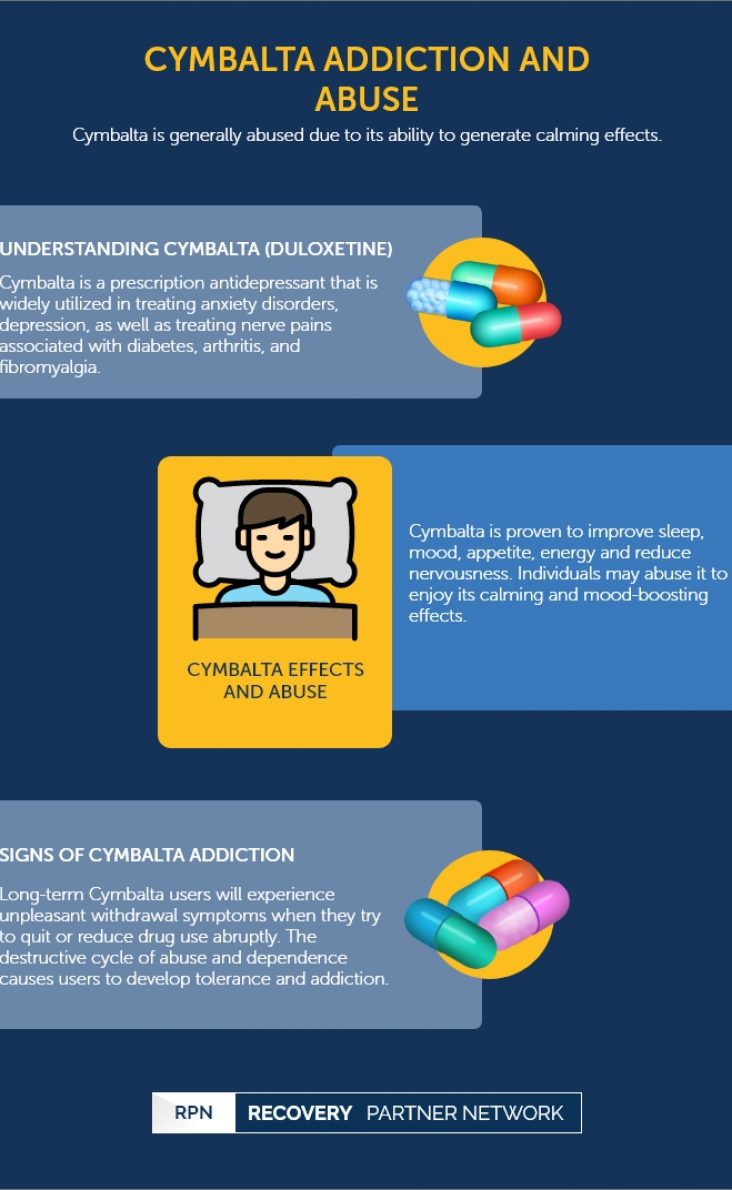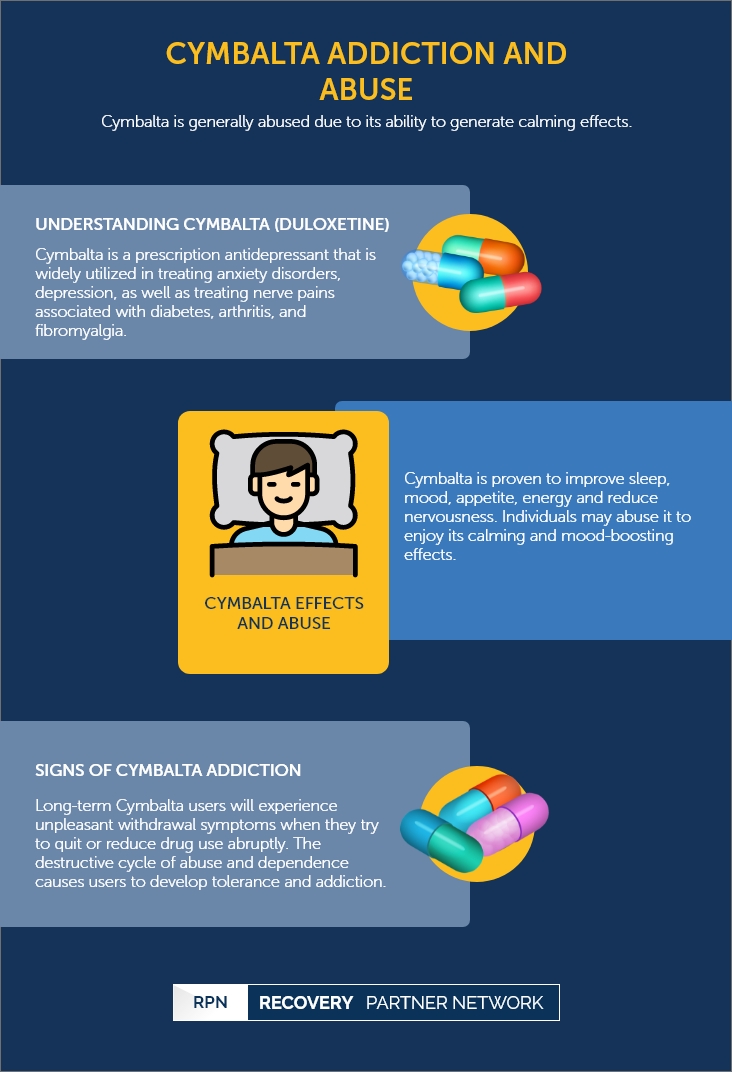Cymbalta is generally abused due to its ability to generate calming effects.
Cymbalta Addiction and Abuse
Duloxetine addiction | Table of Contents
Understanding Cymbalta (Duloxetine)
Cymbalta is the brand name of duloxetine, a prescription antidepressant belonging to the class of drugs known as serotonin-norepinephrine reuptake inhibitors (SNRI). Cymbalta is widely utilized to treat a number of health problems, such as anxiety disorders, depression, and also to alleviate nerve pains associated with diabetes and ongoing pains related to conditions such as arthritis and fibromyalgia.
Cymbalta operates by restoring the natural balance of the brain’s chemical neurotransmitters that are directly connected to mood and pain. Experts believe that the main cause of depression and other psychiatric disorders is an imbalance of the brain’s neurotransmitters. Thus, Cymbalta is prescribed to avoid the reuptake of serotonin and norepinephrine, the two neurotransmitters released by brain nerves. Cymbalta was officially approved by the FDA in 2004 and was further recognized in 2014 as the seventh most prescribed medication in the US alone.
FAQ
Cymbalta is used for the treatment of anxiety and depression. It also helps relieve nerve pain in people with arthritis, chronic back pain, fibromyalgia, or diabetes.
In clinical trials, Cymbalta significantly and quickly improved pain. More than half of the patients with fibromyalgia felt much better within one week. Pain relief may be greater in patients who also have existing depression, although those without depression also showed a significant improvement in symptoms.
It has been found that Cymbalta was well tolerated and safe for elderly patients with major depressive disorder.
Cymbalta Effects and Abuse
Cymbalta is proven to improve sleep, mood, appetite, and energy levels and reduce nervousness. However, apart from these benefits, Cymbalta can also produce various adverse and potentially harmful side effects ranging from mild to severe.
Some of the side effects of Cymbalta are:
- Dry mouth
- Nausea
- Muscle weaknesses
- Vomiting
- Constipation
- Tremor
- Loss of appetite and bodyweight
- Fatigue
- Low blood pressure
- Profuse sweating
- Skin rashes
- Lightheadedness
Some of the other, less common side effects of Cymbalta are sexual dysfunction, colitis, and liver damage, which only occur in chronic, long-term users. The risk of liver damage is higher in individuals who abuse the medication along with alcohol.
Combining Cymbalta with marijuana can lead to fatal consequences. A few short-term studies on antidepressants, such as Cymbalta, have also indicated that the medication incites suicidal thoughts and behaviors in children and adolescents who already battle with depression and other psychiatric disorders.
Individuals who abuse Cymbalta are at a higher risk of encountering the above-mentioned side effects. Drug abuse refers to taking the medication without a prescription or as opposed to the prescription, such as consuming it in higher doses. Although Cymbalta does not induce a euphoric high like most other drugs, individuals may still abuse it to enjoy its calming and mood-boosting effects. Most individuals who abuse Cymbalta crush or mix the drug with a liquid to by-pass the extended time-release mechanism and to feel the desired effects immediately. Such diverted use of Cymbalta will result in a higher risk of serious complications such as abdominal cramping, convulsions, and severe skin allergies.
FAQ
- Can Cymbalta get you high?
- Does Cymbalta help with anxiety?
- Does Cymbalta change your personality?
- Does Cymbalta start working right away?
- Does Cymbalta make you lose weight?
- Is Cymbalta dangerous?
- What happens if you stop Cymbalta suddenly?
People don’t take Cymbalta to get high, in the way they take LSD or marijuana.
Cymbalta can help alleviate anxiety and improve the mood by slowing the absorption of neurotransmitters by brain cells.
Cymbalta can cause certain individuals to experience the opposite effects, such as restlessness and tension, leading to anger and hostility. The drug can result in frustration, irritability, and a lack of patience in some patients.
Cymbalta normally takes 2 to 4 weeks to work. It may take longer if you’re taking it for nerve pain.
In a study conducted in 2006, it had been found that people who took Cymbalta experienced a significant weight loss in the short-term. However, it also showed modest weight gain in some trials.
The manufacturers warn that Cymbalta could result in liver damage, skin reactions, and abnormal bleeding. It can also result in serotonin syndrome, which can be a fatal condition that causes agitation hallucinations and even lead to coma.
Missing a dose may result in an individual experiencing withdrawal symptoms such as vomiting, feeling dizzy, headaches, nightmares, irritability, nausea, and prickling or tingling sensations on the skin.
Signs of Cymbalta Addiction
Similar to most antidepressants, Cymbalta is generally regarded as a non-addictive substance. However, the drug can certainly cause physical dependency in individuals who abuse them compulsively. Long-term Cymbalta users will face unpleasant withdrawal symptoms when they try to quit or reduce drug use abruptly, causing them to keep taking the drug despite wanting to quit. This destructive cycle of abuse and dependence causes users to develop a tolerance to the substance. The formation of tolerance results in the individual requiring higher and higher doses of the drug to experience the desired effects.
No matter what led an individual into Cymbalta misuse, be it to enjoy its calming effects or to prevent withdrawal symptoms, taking higher doses of the drug can be lethal.
Some of the telling signs of Cymbalta abuse are:
- Bloodshot eyes
- Slurred speech
- Drastic weight loss
- Loss of appetite
- Excessive sleeping or insomnia
- Abrupt changes to physical appearance and personal hygiene
- Feigning symptoms to access more Cymbalta prescriptions
- Running into financial troubles
Individuals with addictions or dependence on Cymbalta should never try to quit the medication cold turkey due to the severity of the withdrawal symptoms that usually follow. Cymbalta withdrawal symptoms are so common in users that physicians refer to it as Cymbalta Discontinuation Syndrome.
Some of the withdrawal symptoms of Cymbalta are:
- Nausea
- Migraines
- Depression
- Insomnia
- Rebound anxiety
- Suicidal thoughts
Due to the possibility of the above-mentioned withdrawal symptoms, Cymbalta detox should only be conducted in a medically-supervised environment so that the doctors can monitor vital signs and prescribe medications when necessary. Cymbalta withdrawal symptoms generally last for a couple of weeks. However, it may last for two to three months for some.
FAQ
- What drugs should not be taken with Cymbalta?
- What are the worst side effects of Cymbalta?
- What sleep aid can I take with Cymbalta?
- Should I take Cymbalta in the morning or night?
- How bad is Cymbalta withdrawal?
- Can I drink coffee with Cymbalta?
It is not recommended to take Cymbalta within five days before, or fourteen days after taking an MAO inhibitor, such as methylene blue injection, isocarboxazid, phenelzine, selegiline, linezolid, rasagiline, or tranylcypromine.
Common side effects of Cymbalta include headaches, nausea, and dry mouth. There have been reported cases where patients have suffered liver damage, abnormal bleeding, suicidal thoughts and behavior.
It is best to consult your doctor before taking any sleep aid along with Cymbalta to prevent negative drug interactions.
It’s highly recommended to take Cymbalta at the same time every day. Although some chose to take it in the morning, if it makes you feel drowsy, it is better to be taken in the evening.
When Cymbalta is discontinued, an individual can experience anger, irritability, debilitating brain zaps, extreme mood swings, physical and neurological problems that can go on for weeks, and even months.
There is a high risk of getting serotonin syndrome if an individual consumes a lot of coffee, cola, or other caffeinated drinks whilst taking Cymbalta.
Cymbalta Abuse Statistics
- Around 50 percent of individuals who use Cymbalta for any length of time develop withdrawal symptoms after quitting it abruptly.
- There have been reports of more than forty different types of adverse effects that occur due to continued Cymbalta use, including suicide attempts and hepatic disorders.
- Since its introduction to the market in 2006, more than 17 million prescriptions have been written for Cymbalta.
Recovery Partner Network
We aim to educate and empower. If you feel our library of resources does not cover your specific need, reach out to us, and we would be happy to help.
STATISTICS
© Copyright 2025


